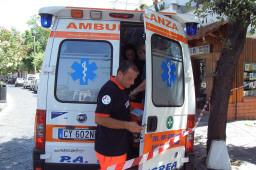Italy was responsible for almost a quarter of all workplace deaths within the European Union (EU 15) in 2005, the most recent year for which comparable data is available, the National Confederal Welfare Institute INCA said on Monday.
According to the institute, 918 of the EU's 4,011 work-related deaths in 2005 took place in Italy.
In the same year, Germany registered 678 workplace deaths, Spain 662, France 593 and Britain 209.
Italy was fourth in the classification for the number of workplace injuries that year with 564,166 cases compared to Germany (913,902), Spain (780,433) and France (685,856).
But Italian workers' insurance agency Inail painted a less gloomy picture on Monday, confirming that work-related deaths and accidents in Italy fell slightly between 2006 and 2007.
There were 1,260 work-related deaths in Italy last year, 6% fewer than in 2006, while the number of injuries also fell, from 928,158 to 913,500.
Inail said around 92% of Italy's 3.7 million service and industry companies had not reported any accidents in 2006.
The agency also noted that the number of work-related deaths in Italy has fallen by two thirds compared to 50 years ago.
According to the latest statistics from Eurostat, Italy's annual average of 2.5 deaths per 100,000 workers is below the EU average of 2.7.
However, unions argue that current figures on workplace deaths are unrealistic, since many accidents involve immigrant workers who are not included in the calculations as they work off the company books.
In April the government moved to curb work-related deaths and injuries in Italy, greenlighting a package of reforms aimed at boosting health and safety in the workplace.
It had been under renewed pressure to improve work safety conditions since December when a fire at the ThyssenKrupp steelworks in Turin killed seven workers and shocked the nation.
The reforms include a tough revision of penal and administrative sanctions and have received some opposition from powerful industrial employers' federation Confindustria.
The decree contains measures to combat illegal labour, protect immigrant workers and tighten control of the subcontracting chain. It also introduces the figure of a workers' safety representative in all firms.
But outgoing Labour Minister Cesare Damiano warned that the success of the norms depended on their full and proper application.
According to ANMIL, an association representing injured workers, the country needs far more work safety inspectors.
The association said that if every Italian business were to be checked by the number of staff currently available, each would receive a visit once every 23 years.













